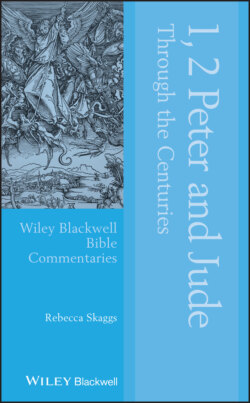Читать книгу 1, 2 Peter and Jude Through the Centuries - Rebecca Skaggs - Страница 44
Ancient Receptions
ОглавлениеTwo main themes are of interest here – the readers’ ignorance of God in their past lives, and the alertness to which Peter urges them. The part that most modern scholars agree on is that the use of “ignorance” sheds light on the nature of Peter’s readers, but there is considerable ambiguity about its deeper implications. It can mean that they are Gentiles who do not know God at all, or Jews who failed to recognize Jesus as Messiah, or a mixture of both. When we consider this entire passage, however, we realize that Peter here is not addressing the classical Jewish/Gentile controversy at all. Rather, he is contrasting the readers’ past existence, characterized by a lack of “knowledge of God,” driven by “desires” derived from ignorance of God. Epithumiai (v.14), means “desire” or “longing,” but Peter associates it with the desires of their old life without God (see Ign., Eph. 19.3; Pseudo‐Clem., Hom. 2.15). Out of this past “empty way of life” (Wallace, 1996: 438, translates it as “futile”), they have been called to be a “holy people” (vv.15–16, 18b, repeated in 2:10 and 4:2–3). The point is that the “empty life handed down to you from your forefathers” refers both to the self‐absorbed life of the Gentiles and the Jewish life characterized by the attempt to justify our own righteousness by works.
Some of the early thinkers like Clement of Rome understand this in a general sense, “Since we are a holy portion, let all our actions accord with holiness” (Epistle, xxx. I: FC: ccel.org). Didymus the Blind concurs (Comm. on 1 Peter: PG 39: 1759). Andreas also agrees, “God insists that we become like him, for in His [God’s] holiness lies our salvation.” (Catena, CEC 46: my tr.). Bede is concerned about the life which embraces this hope. He comments: “The greater is the grace promised you, the more greatly take care that you are worthy to receive it” (Comm., 1985: 77). He goes further and relates this to Jesus’ message about being “perfect as your heavenly Father is perfect” (Matt. 9:2). He also reads this passage in a baptismal context:
Just as the gift of the Lord’s passion … is imperishable, so also is the sacrament of the sacred font by which we were reborn. These are so interrelated to each other that the one without the other cannot confer salvation. (Comm., 1985; 79)
Theophylact (1050–1108), like some of the earlier writers, reads this in a more general sense: “To be conformed to the things of this world means to be surrounded by them. We are to abandon this world and be conformed to the One who alone is truly holy” (Comm. on 1 Peter, PG 125: 1201. my tr.).
